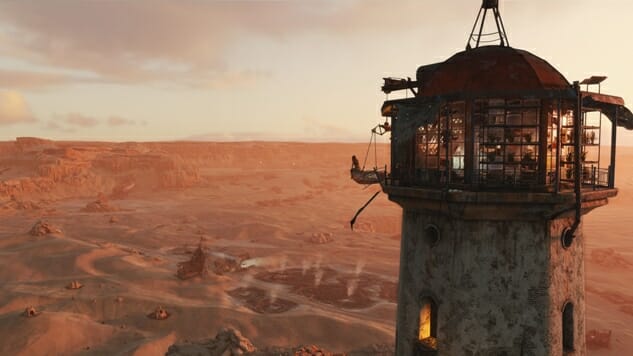Metro Reveals a Whole Wide World in Metro Exodus

I’m in a nightclub beneath a bridge in London right next to the Thames, no more than a football field’s length away from Cleopatra’s Needle. I’m also stranded in the middle of what was once the Caspian Sea, weathering a brutal sand storm that blocks out the sun while trying not to use too many shotgun shells against the swarm of radioactive mutants charging at me from all directions. This is the newly revealed summer portion of Metro Exodus, and even though I’m comfortably ensconced on a soft couch in front of a state-of-the-art TV, I’m feeling the stress.
Metro games have always made players feel the weight of every gunshot. Bullets are a scarce resource in this post-nuclear world, both a means of survival and also a valuable currency, and it’s very easy to run out of them. That’s why I started this little encounter by trying to bash these mutated heads in with the butt of my rifle. A few deaths later I realized I had to stop being precious with my ammo and just do what had to be done to survive.
Metro games are also known for their masterful use of claustrophobia. Making players feel the tight confines and suffocating humanity of Moscow’s subway system was one of the strongest tools in the kit of developers 4A Games. Together with that focus on scarcity and a dark Russian stoicism borrowed from Dmitry Glukhovsky’s series of Metro novels (and, um, pretty much all Russian culture), Metro 2033 and Metro: Last Light remain unique within the world of the first-person shooter—bleaker, sadder and more deliberate than any other shooter.
It’s clear that Metro Exodus has rethought that dependence on claustrophobia within a few minutes of first venturing into the empty basin of the Caspian Sea. Although the train my friends and I travel on throughout the wasteland might be tight and crowded, the world of Metro opens up greatly once I disembark and head towards a radio tower out in the distance. I’m free to wander in any direction, walking over dunes and through the blasted out remains of buildings on the edge of what was once the world’s largest lake, searching for resources or the occasional pocket of mutants to wipe out.
At first this doesn’t feel like a Metro game. Despite the Russian accents and familiar weapon designs, this bright, warm, sun-drenched expanse is as far from the grey hallways and urban hellscapes of the first two games as possible. There was always a fatalistic undercurrent to Metro—a sense that I was doing not just what I had to do, but the only thing that this world would let me do, not within the scope of a videogame but as the character I was playing. By dropping me in this large map with minimal directions and context, Exodus creates a semblance of free will not found in 2033 or Last Light. Between the desert landscape and the effort put into scrapping on-screen indicators in favor of a more diegetic approach to things like the in-game map and the ammo counter, Exodus feels more like a successor to Far Cry 2.


